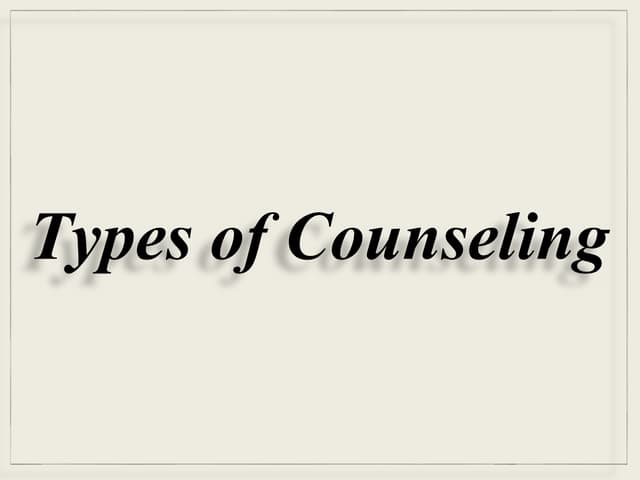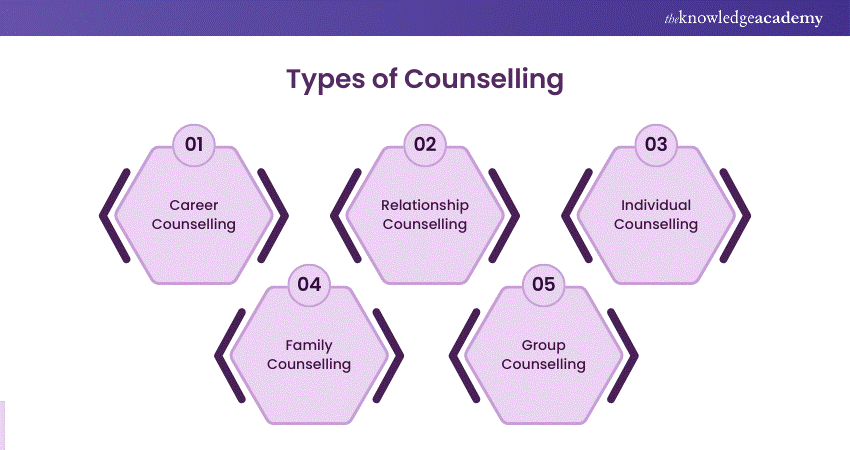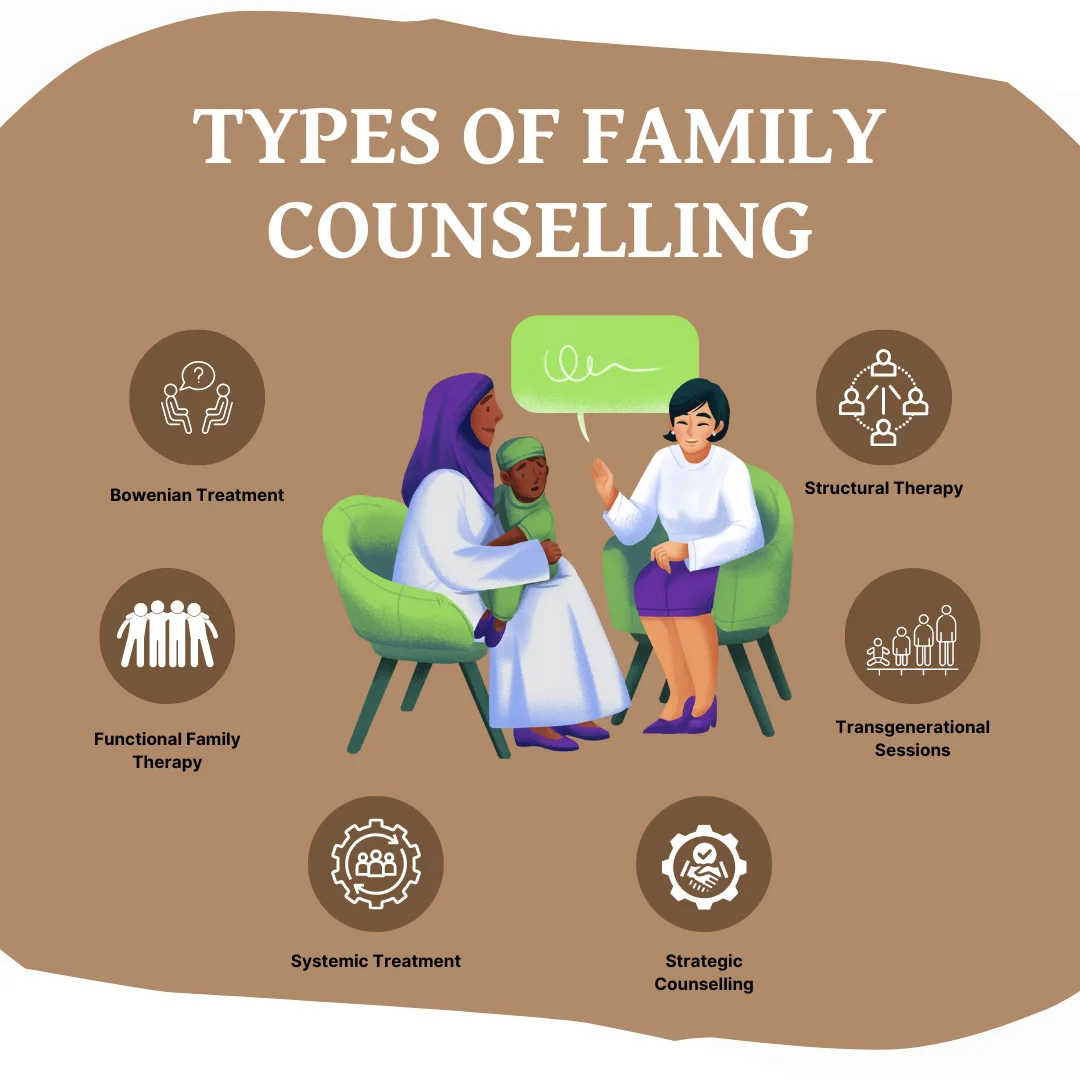relationship therapy: Effective Tips for Healing Conflict
A Comprehensive Overview to the Numerous Sorts Of Coaching and Their Influence
Counseling encompasses a variety of therapeutic approaches, each designed to fulfill distinct psychological wellness requirements. From the structured methods of Cognitive-Behavioral Treatment to the compassionate nature of Person-Centered Therapy, these methods provide unique paths to individual growth. Family treatment and Dialectical Behavior Therapy supply added structures for healing, while group therapy fosters neighborhood support. Understanding these diverse approaches can brighten their extensive influence on private wellness. What stays to be explored are the ins and outs of each technique.

Understanding Cognitive-Behavioral Therapy (CBT)
Although numerous restorative strategies exist, Cognitive-Behavioral Therapy (CBT) attracts attention due to its organized, goal-oriented nature. This type of treatment is based upon the premise that ideas, sensations, and actions are interconnected, and by changing adverse thought patterns, individuals can modify their emotional feedbacks and activities. CBT utilizes numerous techniques, such as cognitive restructuring, which helps clients determine and challenge altered ideas. Behavior activation encourages involvement in enjoyable tasks to fight depression.
Commonly, CBT is a temporary treatment, commonly enduring between 12 to 20 sessions, making it accessible for those looking for quick results. Its performance has actually been well-documented in dealing with stress and anxiety disorders, anxiety, and various other mental wellness issues. The therapist's function is to guide clients with exercises and research projects, fostering self-awareness and advertising lasting coping approaches. This functional method empowers people to take control of their mental health, inevitably resulting in improved life satisfaction.
Checking Out Person-Centered Therapy
Person-Centered Treatment, established by Carl Rogers, uses a contrasting technique to Cognitive-Behavioral Therapy by stressing the client's subjective experience. This healing version focuses on the individual's perspective, fostering an atmosphere of compassion, genuine favorable respect, and authenticity. By enabling customers to discover their feelings and thoughts without judgment, therapists promote individual development and self-discovery.
The core tenet of Person-Centered Treatment is the belief that individuals have the intrinsic ability for self-healing and individual growth. In this setting, the specialist functions as a supportive overview rather than a directive authority, motivating customers to organize their very own journey. This strategy is particularly effective for those facing concerns such as reduced self-worth, anxiousness, or depression, as it encourages them to confront and comprehend their feelings. Inevitably, Person-Centered Therapy grows a solid restorative partnership, cultivating count on and visibility necessary for significant modification.
The Function of Family Members Treatment in Recovery
Family treatment functions as an essential component in the healing procedure for individuals and their connections. This healing approach focuses on enhancing communication, settling problems, and cultivating much deeper connections among relative. By resolving inefficient dynamics, household therapy motivates each member to share their ideas and feelings in a secure atmosphere, promoting understanding and empathy.

The influence of family therapy expands beyond the sessions, as boosted partnerships can cause enhanced emotional well-being for all involved. Generally, household therapy plays an important duty in recovery by cultivating unity, resilience, and shared assistance among member of the family, inevitably leading them towards a much healthier, extra meeting life with each other.
Unboxing Dialectical Behavior Modification (DBT)
Building on the structure of therapeutic techniques that enhance psychological well-being, Dialectical Behavior modification (DBT) offers an organized framework for people having problem with extreme emotions and behavioral difficulties. Established by Marsha Linehan, DBT incorporates cognitive-behavioral strategies with mindfulness methods, intending to help clients take care of overwhelming sensations and boost interpersonal effectiveness.
The treatment is particularly valuable for those detected with Borderline Individuality Disorder but is also appropriate to a variety of other psychological health and wellness problems. relationship therapy. DBT includes specific therapy sessions and skills training groups, focusing on four essential capability: mindfulness, distress resistance, feeling guideline, and interpersonal performance
The Benefits of Group Coaching Sessions
While specific treatment gives beneficial insights, group therapy sessions use one-of-a-kind advantages that can considerably enhance the therapeutic experience. One important advantage is the sense of neighborhood that arises among participants. Individuals often discover comfort in sharing their experiences with others dealing with comparable obstacles, fostering an encouraging atmosphere that minimizes feelings of seclusion.
Team sessions urge varied viewpoints, permitting individuals to discover from each other's coping techniques and understandings. This cumulative wisdom can lead to improved problem-solving capacities and a broader understanding of individual problems.
Additionally, group therapy frequently promotes liability, as participants motivate one an additional to pursue their objectives and follow their commitments. Ultimately, the cost-effectiveness like it of team therapy makes it an easily accessible choice for numerous people seeking support. On Find Out More the whole, the joint nature of team therapy sessions can substantially enrich the healing journey.
Regularly Asked Questions
What Credentials Do Specialists Required to Exercise Counseling?
Specialists usually require a relevant level in psychology or counseling, in addition to supervised medical experience. Additionally, they must obtain suitable licensure or accreditation to exercise lawfully, making certain adherence to specialist standards and ethical standards.
Just how Do I Choose the Right Type of Therapy for Me?
Choosing the best type of treatment includes assessing personal demands, discovering various approaches, thinking about specialist specializeds, and looking for referrals. Recognizing private goals and choices can greatly enhance the performance and fulfillment of the healing experience.

Are Online Counseling Sessions as Effective as In-Person Ones?
The efficiency of online therapy sessions compared to in-person ones often depends upon individual choices and scenarios. Research indicates that both techniques can yield positive outcomes, though some may find better comfort in face-to-face interactions.
For How Long Does Counseling Normally Last?

What Should I Anticipate During My First Counseling Session?
Throughout the very first therapy session, clients can expect an intro, discussion of their concerns, establishment of objectives, and an overview of the counseling process - adhd counselling. This first meeting aims to build relationship and guarantee comfort